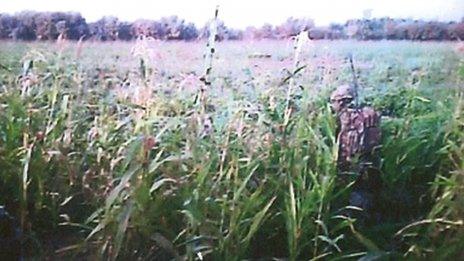Murder 'must not besmirch Royal Marines', Cameron says
- Published
- comments
David Cameron: "The appalling case in no way represented the spirit and proud history of the Royal Marines"
The conviction of a Royal Marine for murdering an injured Afghan insurgent should not "besmirch" the organisation, Prime Minister David Cameron has said.
Speaking to marines at Downing Street, Mr Cameron said the "appalling" case in no way represented the spirit and proud history of the Royal Marines.
The sergeant, identified only as Marine A, was convicted over the shooting of the unknown man in 2011 on Friday.
A retired commander has said he should be shown leniency when he is sentenced.
Addressing a group of serving and former Royal Marines raising funds for the Commando 999 charity, Mr Cameron said the Royal Marines had "one of the proudest histories of any in the world".
"We should not let that single incident besmirch the incredible work the Royal Marines have done, not only over decades but over centuries," he said.
The prime minister also thanked the marines for the "incredible work" they had done in Afghanistan, saying he believed "we will be able to leave that country with our heads held high".
Labour leader Ed Miliband said it was a "tragic" incident and must be dealt with, but the case did not change the "esteem in which our armed forces are held".
'Friends brutalised'
Marine A faces a mandatory life sentence but a minimum term will be set on 6 December.
Maj Gen Julian Thompson, who led 3 Commando Brigade during the Falklands War, said a five-year or 10-year term would be more appropriate than life.

The judge released stills from the footage but not the footage itself
He told BBC Radio 4's Today programme the shooting of the Afghan insurgent in Helmand Province was "totally wrong, totally unforgiveable" and it was "quite right" that Marine A would be sentenced.
But he said we did not know what pressure the sergeant might have been under in the past.
"I understand that he's quite an experienced guy. People are talking about him being battle hardened and therefore there is no excuse.
"Well actually it's the other way round, the more times you do tours in that filthy war, the more pressure there is on you," he said.
He said some sort of clemency should be exercised.
"He certainly shouldn't serve any less than five years, maybe 10. I hope that his behaviour and the fact he truly regrets what he did would be taken into account when the time comes," he said.
Military commentator Colonel Mike Dewar said he was "horrified" by Marine A's actions but echoed calls for clemency, saying society had to make "exceptions for soldiers in extraordinary circumstances".
"These soldiers have had their officer killed - their platoon commander, a very fine young man - they had seen their friends brutalised, lost legs, they had been under the pressures of battle for weeks and months," he said.
But former Army Major Richard Streatfeild told the BBC it was too soon to tell what kind of sentence would be appropriate.
"We don't know enough about his personal situation in terms of a plea of mitigation yet," he said.
However, he said he agreed with Maj Gen Thompson about the "cumulative effect" war could have on members of the armed forces.
'Amounted to execution'
It is the first time a member of the British forces has faced a murder charge in relation to the conflict in Afghanistan, which began in 2001.
Two other marines were cleared after the trial at the Military Court Centre in Bulford, Wiltshire. An anonymity order was granted last year to protect the three men from possible reprisals.
The murder took place after a patrol base in Helmand Province came under attack from small arms fire from two insurgents.
The Afghan prisoner had been seriously injured by gunfire from an Apache helicopter sent to provide air support, and the marines found him in a field.
One of the cleared marines - known as Marine B - inadvertently filmed the murder on his helmet-mounted camera and that footage, taken on 15 September 2011, was shown to the court during the two-week trial.
It showed Marine A shooting the Afghan prisoner with a 9mm pistol, and saying: "There, shuffle off this mortal coil... It's nothing you wouldn't do to us."
He adds: "Obviously this doesn't go anywhere fellas. I just broke the Geneva Convention," to which Marine B replies: "Yeah, roger mate."
During the court martial, prosecutor David Perry told the court the murder was "not a killing in the heat and exercise of any armed conflict. It amounted to an execution".
Extract from helmet camera recording of incident in Helmand, Afghanistan
Marine A told the court martial he had fired because of "poor judgement and lack of self-control", but said he had thought the insurgent was already dead.
Marines B and C were accused by the prosecution of being "party to the killing" and of having "encouraged and assisted" Marine A to commit the murder.
At the time of the killing, Marine A was an experienced sergeant, Marine B was new to the Helmand base, while Marine C was the most junior of the three.
- Published8 November 2013
- Published8 November 2013
- Published8 November 2013
- Published8 November 2013
- Published7 November 2013